- Home
- Kim Newman
Angels of Music Page 8
Angels of Music Read online
Page 8
Many veiled ladies showed up for de Rosillon’s funeral. Afterwards, two fought a duel for the right to declare themselves his widow. Neither were hurt badly. Both soon found patrons to soothe their grief.
The Agency successfully concluded small cases. Unorna exposed ‘Sesostris, the Sorceress of Ecbatana’, a fraudulent medium who sold bogus maps to the lost treasure of Monte Cristo. La Marmoset solved a puzzling mystery which began with poisoned pet cats and thwarted an attempt on the life of a popular lady novelist who had just made a will in favour of her English butler.
For her part, and off the books, Sophy mercifully crippled a ponce who signed his name on girls with a branding iron. She left the women to dispose of him as they saw fit.
The Agency disapproved of side-ventures, but justice must be served as she saw it… not according to the dictates of a man behind a mirror.
Sophy was in two minds about masterminds.
But she liked La Marmoset – in most of her persons – and warmed to the strange-eyed new girl, Unorna. She was even fond of the Persian.
The world of the opera house was endlessly diverting. Coming and going by the stage door, she was often taken for a singer or a dancer. Like Erik, she was emotionally attached to the company – fiercely critical of missteps, yet partisan as the longest-serving claqueur. Protective of chorus and corps de ballet, she cast an eye over the crowd of young men who gathered at the stage door, cautioning girls against fellows who struck her wrong.
There were always one or two…
The great success of the season was a revival of Macbeth. Anatole Garron gave the performance of his career in the title role, and was widely praised and toasted. Erik sent a rare note of approval to Garron, who was suitably humbled. As a rule, the Phantom paid scant attention to baritones – or to male opera singers in general – but, like le tout-Paris, he admired the magnificent, murdering thane.
It was adjudged that Garron bettered Ismaël, who had originated the French version of the role some twenty years earlier. Then, the much-awaited piece was a sorry failure. Ismaël lived long enough to fume in silence as his successor took curtain calls. Even Signor Verdi, who would only really be satisfied if he could sing all the parts and conduct the orchestra himself, thought Garron ‘quite good – for a Frenchman…’
Wherever Garron went, the cry of ‘Macbetto’ followed him.
Couturiers put higher prices on tartan. The success set off a fashion for Scottish plaids.
In Dressing Room 313, the Persian read the latest notices. All the newspapers – and some of the newspaper critics – who had dismissed Macbeth as overblown and tuneless in 1865 now declared it a masterpiece. Throughout the run, the raves poured in.
But the house was not entirely happy.
With receipts up, everyone thought they should be paid more – but the Management always said expenses were up in excess of income.
And there were accidents.
‘In England, they say Macbeth is unlucky,’ observed Unorna.
La Marmoset, who wore a frock coat and trousers, cocked an ear. She was gumming a precise little goatee and moustache to her face.
‘In an English theatre, it is not done even to mention the title,’ Unorna explained. ‘When it must be talked of, actors call it “the Scottish play”.’
‘Pah!’ said La Marmoset, experimenting with a new character – a French literary lion with more opinions than published works. ‘The superstition of fools and dullards. For Anatole Garron, Macbeth has proved lucky.’
‘But only at the expense of some other fellow,’ said Sophy. ‘A detective might suspect someone jostled the hand of fate…’
Opportunity came late in Garron’s career. Aside from an early role in – strange to relate – Marschner’s Der Vampyr, he had seldom been given star parts. He was so convincing as a vampire, producers were reluctant to cast him as a normal man, yet Méphistophéles, a plum non-human bass-baritone role, was literally out of his range.
As Macbeth went into rehearsal, Giovanni Jones – the company’s premier baritone – happened to choke on a stew-bone and lose his voice. Jones’s Macbetto costumes were taken in for the less substantial Garron, who surprised everyone with his impassioned performance. All Paris applauded… except Jones, who remembered Garron had insisted he try the lapin en cocotte at the little restaurant in Impasse Sandrié. The bitter, laid-up singer muttered that his successor didn’t need acting ability to play an ambitious second-rater who’d go to any lengths to get a king out of his way and steal a crown.
‘It’s the nature of the piece,’ said La Marmoset. ‘All the witches and prophecies and ghosts and murders. Gloomy associations. The same with Faust and its devils. Bad things always happen when Faust is given.’
Sophy noticed the Persian shuddering at that.
‘So, when Macbeth is playing and a stagehand stubs his toe or a dancer’s brother falls over miles from the house or a bit of Birnam Wood catches fire… why, it must be the curse! The hens cluck and cross themselves and spit three times. Yet things are always happening, good and bad. They happen for reasons observable to the trained mind. When mishaps mishappen while a comedy is on stage, no one says dark forces are at work.’
‘There are curses,’ said Unorna, who was laying out a Tarot deck. ‘There are spirits all around.’
‘Are there vampires?’ asked Sophy.
The Witch of Prague shrugged slowly like a stretching cat. She gave one of her peculiar half-smiles. Her grey eye glistened and her brown eye gleamed.
‘I have no reason to believe there aren’t,’ she said.
Why was the Witch really here? Sophy half-thought her less interested in Erik’s reputed magic powers than in the tricks which convinced people he was a ghost.
‘There are more things in Heaven and Earth, Horatio,’ intoned Unorna.
‘That’s Hamlet, not Macbeth,’ said La Marmoset. ‘He is overrated, that Englishman. His comedies – ha! – they are not funny. His tragedies – heh! – they are not sad. And his histories – ho! – they are all lies. He is not fit to fill the inkwell of Pierre Gringoire or cut the quill of François Villon.’
La Marmoset was now completely a made-up character. Her hair was oiled and plastered, with a kiss-curl on her forehead. She even seemed to be balding.
Sophy admired her friend’s knack of disguise, but – in quiet moments – worried about it too. When she and Paul were little and pulled faces, their English nanny had an expression that frightened them: ‘When the wind changes, you’ll be stuck like that!’
What would happen to La Marmoset if the wind changed?
Unorna surveyed her scrying cards and frowned.
She gathered them up quickly, shuffled and laid them out again.
Then she meticulously tidied the pack and kept its secrets to herself.
‘We are bored, Daroga,’ said Sophy. ‘Find us something to do.’
‘Ah, the Angels are restless,’ commented the Persian. ‘And, as usual, Erik is occupied elsewhere. I find myself governess to girls who all act as if they’ve only just celebrated their sixth birthdays.’
The Angels laughed, but it was true.
Left to their own devices, they made mischief.
La Marmoset wrote anonymous letters to the newspapers, naming the culprits in open police cases. She could glance at the briefest report of a crime and pick out vital clues that had been missed. This hobby was not popular with the police… or criminals.
Unorna cultivated carnivorous orchids in a specially heated chamber beneath the boiler room. She fed them on rats bought from the house catcher at five centimes a rodent. From these blooms, she distilled potions which stank out the place.
Sophy threw on a shawl, put a bayonet in her reticule, and went about the city until she spotted a woman with a black eye or a thick lip. She would follow the poor soul to the man – husband, father or employer – who had hurt her, then cut off one of his hands and slap him with it.
‘Be patient and Erik will pr
ovide amusement… perhaps more than you would like.’
As if invoked, the shadow of the Phantom rose behind the mirror…
Sophy suspected he had ways of knowing what others thought, either by Unorna’s method of mental telepathy or La Marmoset’s method of observing telltale twitches.
The Angels and the Persian all noticed him at the same time.
‘Ladies, Daroga,’ he began.
The voice, a forceful purr, seemed to come from everywhere in the room at once. A trick of acoustics, or ventriloquism. Once, when the women thought themselves really alone, Unorna tried to match the effect – but had to admit defeat.
‘Tonight, the final performance of Macbeth will be given,’ intoned Erik.
Posters were up all over the building with ‘Last Night’ plastered across them. Scalpers offered tickets at twenty times the listed price. If not otherwise occupied by skirmishes with the police, Les Vampires would have counterfeited tickets and sold them at forty times the listed price.
‘I shall watch the performance,’ continued the Phantom. ‘As a special concession, you may join me.’
Box Five was permanently set aside for Erik’s use.
‘Afterwards, there is to be a masked ball to celebrate the great success.’
At the Paris Opéra, Sophy thought, there would be a masked ball to celebrate a great failure… or commemorate the opening of a ham pie.
‘I have approved of the production… of Garron… and we shall bestow upon the ball the honour of our attendance.’
Without the triviality of invitations, of course.
‘Costumes will be provided for you all. Tonight is the night of Macbetto!’
V
AFTER TWENTY-SEVEN CURTAIN calls, Anatole Garron was borne from the stage on the shoulders of the entire company. Applause thundered for a half-hour after his final bow. The huge, heavy curtains shook. The musicians of the orchestra pit left in their wax earplugs. Stage-hands up in the rigging clung dearly to ropes. Patrons with long memories made sure they weren’t sitting directly beneath the great, rattling chandelier. No one wanted to be added to the tally of accidents ascribed to the curse of Macbeth.
In Box Five, everyone was in a good mood.
Erik was in a trance, elbows on the plush velvet rest, tears trickling down his mask. Music reached his cold heart if all else failed.
La Marmoset delighted in pointing out clues left by the Macbettos which would have put a trained detective on their scent from the first alarm. Sophy enjoyed anything with murder, especially when the villain was exposed in the end and properly beheaded. Unorna hummed along with the witches, chorusing prophecies and incantations.
The Persian had stayed awake throughout.
He rarely mentioned his indifference to European music. The setting of the play – a French translation of an Italian opera set in an Englishman’s idea of Dark Ages Scotland – reminded him of the Mazenderan of his youth. He had first met Erik in that province, in the service of the Khanum. Beside that power-behind-the-throne biddy, Lady Macbetto was a merry milkmaid. The Khanum ruled through the proxy of her feebleminded son not her lackwit husband, and would have scorned Macbetto’s tally of a few ordinary dirkings as the fumbles of a mere starter. She took pride in killing with imagination and ingenuity. That was why she had employed a skull-faced foreign freak in the first place – to build palaces of the perverse and mazes of murder, for her own entertainment and that of her favourite daughter-in-law, the giggling, bloodthirsty little Sultana. Nothing he had seen during the Paris Commune was worse than the Red Nights of Mazenderan.
Then, the Persian had been Daroga, a humble chief of police – something detectives, criminals and assassins of his current acquaintance tended to forget. He knew all too keenly that a trained detective of the Dunsinane Constabulary might look askance at a witness who claimed to have found the victim’s butchered body then impulsively executed the nearest suspects before they could be questioned. He also knew such a solution would be a tricky sell to superior officers when time came to write out an arrest warrant – especially if the person of interest happened to be a newly crowned king. In his experience, absolutist tyrants didn’t bother even with transparent cover-ups like smearing blood on the dead patsies. The Khanum wanted her people to know how messily her enemies died. She made no song and dance about regretting her crimes or getting bloodstains off her nightgown.
* * *
The after-show ball was held in the great foyer of the Palais Garnier so members of the company – and special guests – could make entrances at the top of the imposing marble staircase then descend at an even pace so all eyes could admire their costumes. All well and good for those who had been in the opera, but guests from outside had to be spirited through the stage doors and the wings up to the first floor so they could appear as if by magic and parade down to the party.
A lone bagpiper – who said he was Scotch, though his hair was dyed red and he spoke with an Albanian accent – stood at the foot of the stairs, setting distant dogs to whining with tuneless skirls. Eventually, Monsieur Rémy, secretary to the Director, paid the piper to stop. The Persian was grateful the functionary got to him with coin before Erik did with a strangling cord.
With a simple tartan eye-mask and matching sash, the Persian mingled with the celebrants. All around were people in costume – Macbettos, Lady Macbettos, witches in sets of three, the odd Hecate (not actually present in the opera), Bancos, Duncanos, chieftains, ladies in waiting, ladies who were fed up and no longer waiting, ghosts of kings despatched and apparitions of kings yet to come.
The Persian counted seven sets of witches… including competing trios of artistes from the Alcazar d’Hiver and Le Chat Noir who were certain to belabour each other’s tall hats with prop besoms before chucking-out time.
The most entertainingly ill-behaved beldames were tourists from out of town, the consorts – some said wives – of an Eastern European nobleman. According to the weekly gazetteer of notable visitors, they were the Countesses Dorabella, Clarimonde and Géraldine. Two dark, one fair, all surpassingly beautiful. Their Count was on a boring business trip to London. Determined not be seen dead in that drizzly hole, they occupied an entire floor of Le Grand Hôtel. With a line of credit from the House of de Rothschild Frères, the red-lipped hoydens haunted the high-priced shops of Paris, a city worth the sacking. They reputedly picked up and tossed aside lovers the way other women went through hairpins. A rash of mystery illnesses, nervous collapses and religious conversions afflicted their cast-offs.
There were surely enough unattached – indeed, suddenly unattached – politicians, guardsmen, poets and financiers in the house to keep the Countesses busy for a few nights. But if one sighted a likely prospect, they all were interested and fellows were being forever nipped and pinched and dragged into antechambers for brief, debilitating liaisons. The three wore long white shrouds and jewelled headdresses and went barefoot on the marble floor. The Persian wondered why they didn’t freeze their toes off. He kept well out of their way.
The decadent Des Esseintes had got his Shakespeare mixed up and come as Cleopatra, attended by bare-chested pageboys painted gold. Louis-Amédée, Marquis de Coulteray, was the most impressive Duncano, blood-boltered from head to foot and licking gory lips. On his arm, got up as Hecate, was Joséphine Balsamo, Countess Cagliostro. The Persian still instinctively put her first on the list of suspects for any and all mysterious crimes committed in Paris. She never apparently aged, which was one of the characteristics of the traditional vampire – though he couldn’t imagine her lowering herself to drink anything less effervescent than champagne or putting on bat-wings and hopping from one chimney pot to the next.
Giovanni Jones stalked through the crowd with an oversized cardboard dagger stuck out of his back. In a company where several guests dressed as the proverbial spectre at the feast, the baritone made the extra effort to secure the role for his own.
The Persian recognised a comely Prince Hamlet as Ayda H
eidari and patted his pockets to make sure his wallet and watch were still about his person. Then he remembered Les Vampires liked to send an obvious thief into a crowd to make people do exactly what he had just done so the pickpocket you didn’t recognise knew where to strike. Ayda saw his aghast look and came over to say she was off-duty tonight.
‘Did you enjoy the opera?’ he asked.
‘Too much blood,’ she said, and was whirled away, pounced on by a duchess of a certain age who mistook her for a young lad – or perhaps didn’t much care who was inside the doublet and hose. Opera balls were notoriously licentious.
With a threefold pincer movement, the Countesses trapped the singer Gravelle under a twenty-foot statue of Salome holding a severed head on a plate. As they competed to lick him all over, his bass baritone rose to tenor yelps. One of the Countesses bit his earlobe too enthusiastically. A knot of gawkers obscured the view, which was just as well.
The Persian was surprised to see the bold vampire hunter Inspecteur d’Aaubert holding court by the buffet table, in full dress uniform with plumed hat and sword. A very fair woman in a simple green dress was at his side.
Making it his business to drift closer to the group, the Persian overheard the Inspector expressing confidence in the likeliness of an early arrest in the stone-cold murder at the Hôtel Meurice.
‘The nights of Les Vampires are numbered.’
‘Our old friend must be missed,’ suggested a tall gentleman who had a Viennese accent.
‘Of course,’ said d’Aubert. ‘The Count de Rosillon was a fine fellow, very high up in… you know… intelligence.’
The policeman made gestures which suggested but did not outright state that the victim was a dauntless servant of the state murdered for getting too close to exposing a treasonous conspiracy.
‘You surprise me, Raoul,’ said the tall gentleman. ‘The Camille I remember would be the least likely to be accused of association with… intelligence.’

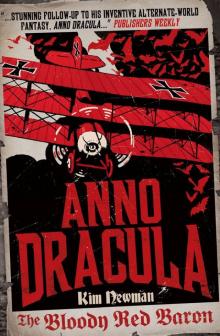 The Bloody Red Baron
The Bloody Red Baron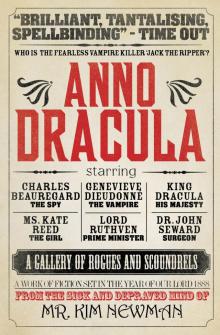 Anno Dracula
Anno Dracula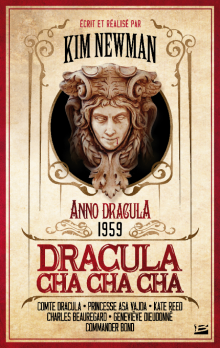 Dracula Cha Cha Cha
Dracula Cha Cha Cha Anno Dracula 1999
Anno Dracula 1999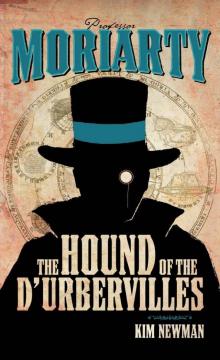 Moriarty: The Hound of the D'Urbervilles
Moriarty: The Hound of the D'Urbervilles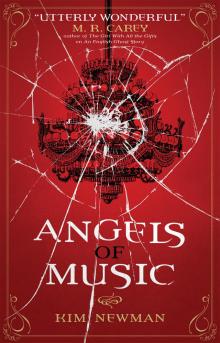 Angels of Music
Angels of Music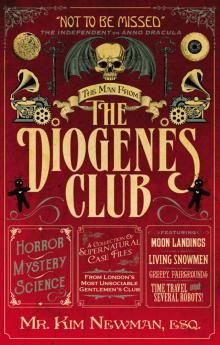 The Man From the Diogenes Club
The Man From the Diogenes Club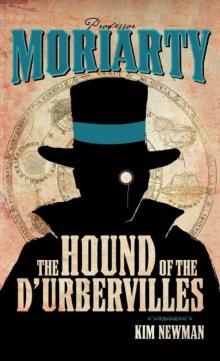 Professor Moriarty: The Hound Of The D’urbervilles
Professor Moriarty: The Hound Of The D’urbervilles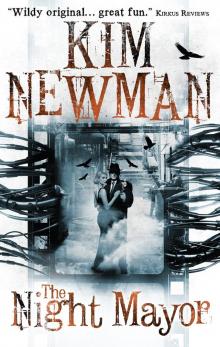 The Night Mayor
The Night Mayor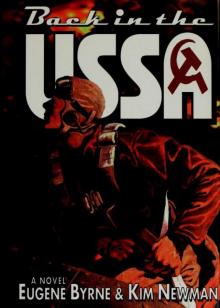 Back in the USSA
Back in the USSA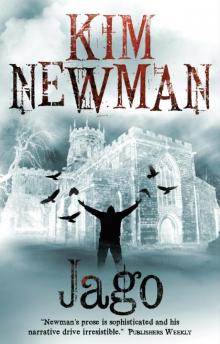 Jago
Jago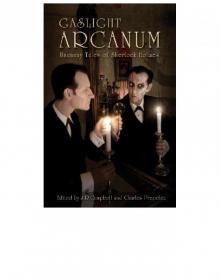 Gaslight Arcanum: Uncanny Tales of Sherlock Holmes
Gaslight Arcanum: Uncanny Tales of Sherlock Holmes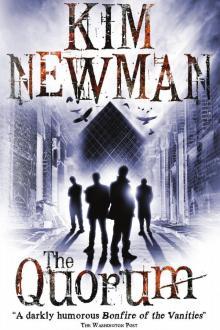 The Quorum
The Quorum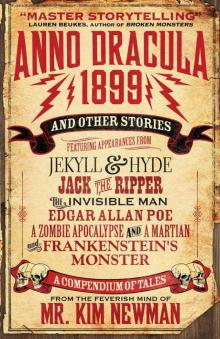 Anno Dracula 1899 and Other Stories
Anno Dracula 1899 and Other Stories Life's Lottery
Life's Lottery The Secrets of Drearcliff Grange School
The Secrets of Drearcliff Grange School Anno Dracula ad-1
Anno Dracula ad-1 The Bloody Red Baron: 1918 ad-2
The Bloody Red Baron: 1918 ad-2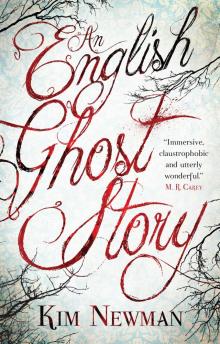 An English Ghost Story
An English Ghost Story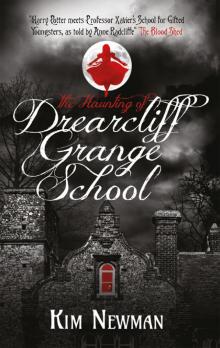 The Haunting of Drearcliff Grange School
The Haunting of Drearcliff Grange School The Other Side of Midnight
The Other Side of Midnight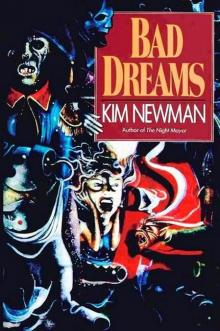 Bad Dreams
Bad Dreams Anno Dracula--One Thousand Monsters
Anno Dracula--One Thousand Monsters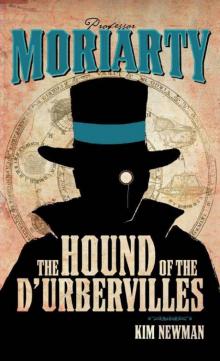 The Hound Of The D’urbervilles
The Hound Of The D’urbervilles The Bloody Red Baron: Anno Dracula 1918
The Bloody Red Baron: Anno Dracula 1918